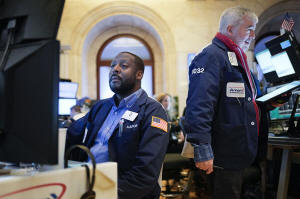Stock market today: Wall Street surrenders gains after White House
confirms Trump tariff move
 Send a link to a friend
Send a link to a friend
 [February 01, 2025] By
STAN CHOE and DAMIAN J. TROISE [February 01, 2025] By
STAN CHOE and DAMIAN J. TROISE
Stocks on Wall Street surrendered early gains and closed broadly lower
Friday after the White House said President Donald Trump would impose
promised tariffs on key U.S. trading partners.
The S&P 500 fell 0.5% and the Nasdaq composite dropped 0.3%. The
indexes, which had posted solid gains in morning trading, posted their
first weekly loss in three weeks.
The Dow Jones Industrial Average fell 0.8%.
Trump will put in place 25% tariffs on imports from Canada and Mexico
and 10% tariffs on goods from China effective Saturday. The White House
provided no word on whether there would be any exemptions to the
measures that could result in swift price increases to U.S. consumers.
The selling was broad, with about 75% of the stocks in the S&P 500
closing lower. Technology and energy companies accounted for a large
share of the decline.
“If Trump says it’s something that could happen by tomorrow that doesn’t
leave a lot of room to move,” said Sam Stovall, chief investment
strategist at CFRA. “There’s just so much uncertainty associated with
elevating tariffs on our three major trading partners.”
The earlier gains on Wall Street had helped shave losses from the start
of the week over worries that the artificial-intelligence boom may not
require as much investment as thought.

Apple reversed course from market leading gains to a loss of 0.7%. The
company had reported stronger profit for the latest quarter than
analysts expected. Wall Street’s most valuable company, and thus the
most influential on the S&P 500 and other indexes, said sales of iPhones
dipped. But revenue for its services businesses, such as AppleCare and
its app store, rose to a record.
KLA, a supplier to the electronics industry initially rose after
reporting profit and revenue that topped analysts’ expectations, but
then closed down 0.6%. The company, which credited its results on
expanding artificial-intelligence and high-performance computing
investments, fell 6.3% on Monday. That’s when tech stocks around the
world tumbled, after a Chinese upstart, DeepSeek, said it developed a
large language model capable of competing with the world’s best, without
having to use top-flight chips.
The disruption raised questions about whether all the investment
expected for AI chips, data centers and electricity is really needed.
Shares of Nvidia, considered the poster child for the AI frenzy, fell
3.7%. They dropped 15.8% for the week. Its CEO, Jensen Huang, was
expected to meet with Trump Friday in Washington.
Worries that tariffs could end up driving inflation higher helped push
long-term bond yields higher, including the 10-year Treasury, which rose
to 4.54% from 4.52% late Thursday.
[to top of second column] |

Traders work on the floor at the New York Stock Exchange in New
York, Wednesday, Jan. 29, 2025. (AP Photo/Seth Wenig)
 “It’s not the safe haven that it
normally is because these tariffs might result in higher inflation
and the need for the Fed to remain on pause for longer or to reverse
course and raise rates,” Stovall said.
Shorter-term U.S. government bond yields mostly
fell.
Yields have been generally climbing since September as the U.S.
economy has remained much more solid than economists expected. More
recently, worries about tariffs and other possible Trump
administration policies that could add upward pressure on inflation
and the U.S. government’s debt have also sent yields higher.
The Federal Reserve left its benchmark interest rate unchanged as it
closed out its most recent meeting Wednesday. The central bank is
signaling a more cautious approach as it waits to see how policies
under Trump will impact inflation and the broader economy. Higher
tariffs and tax cuts could push inflation higher, while deregulation
could possibly reduce it.
“Markets are on edge watching President Trump’s plans to raise
tariffs and tighten immigration policies, since both are pressuring
the Fed to keep interest rates elevated," said Bill Adams, chief
economist for Comerica Bank.
On Wall Street, Walgreens Boots Alliance dropped 10.3% after
suspending its dividend and breaking a streak of quarterly payouts
to its shareholders that stretches back more than 90 years.
Exxon Mobil ticked down 2.5% even though the energy giant posted a
stronger fourth quarter profit than Wall Street had forecast. Exxon
credited increased production in the U.S. Permian basin and in
Guyana for the strong results, but its revenue came in lower than
expected.
All told, the S&P 500 fell 30.64 points to 6,040.53. The Dow dropped
337.47 points to 44,544.66. The Nasdaq lost 54.31 points to close at
19,627.44.
In stock markets abroad, indexes ended mixed in Europe after also
finishing mixed in Asia.
Japan’s Nikkei 225 index added 0.1% after a report showed that the
country’s core inflation rate topped the central bank’s 2% target,
paving the way for further hikes to interest rates.
The Kospi in South Korea fell 0.8% after trading resumed there
following holidays. Markets remained closed in Hong Kong and
Shanghai for the Lunar New Year.
____
AP Business Writer Alex Veiga contributed.
All contents © copyright 2025 Associated Press. All rights reserved
 |